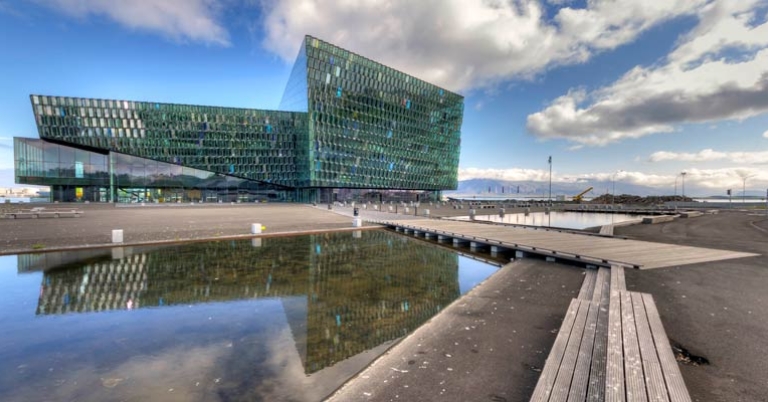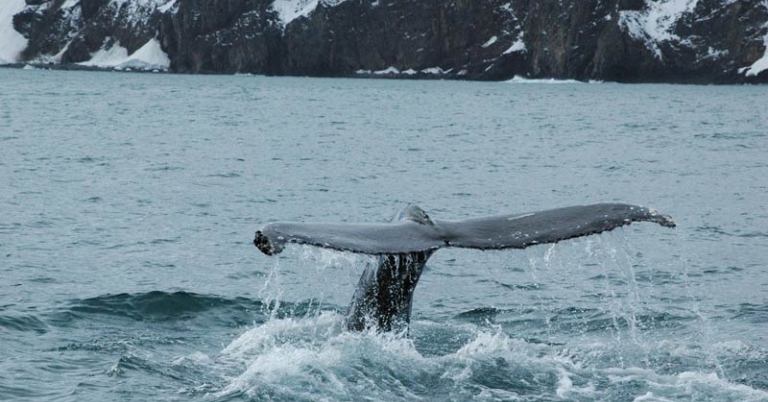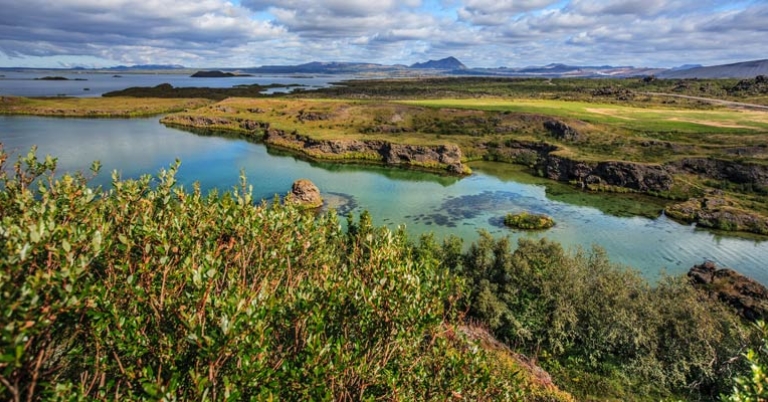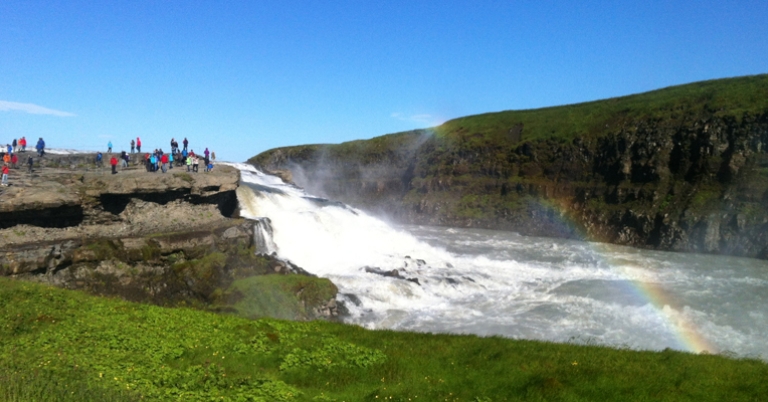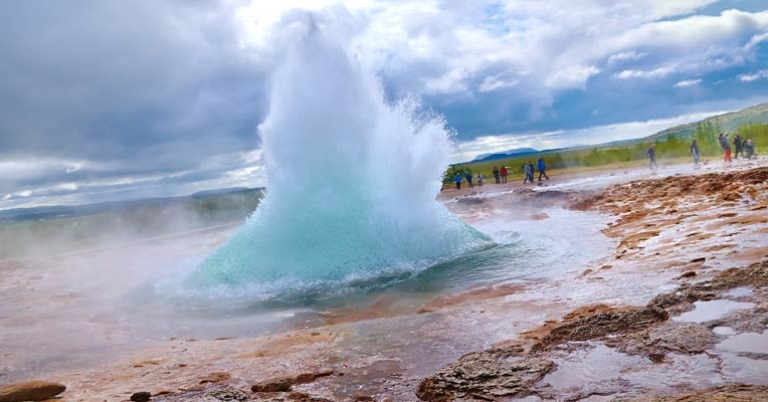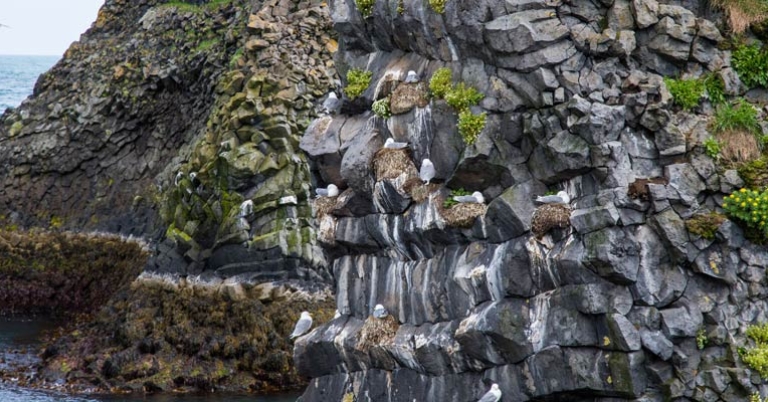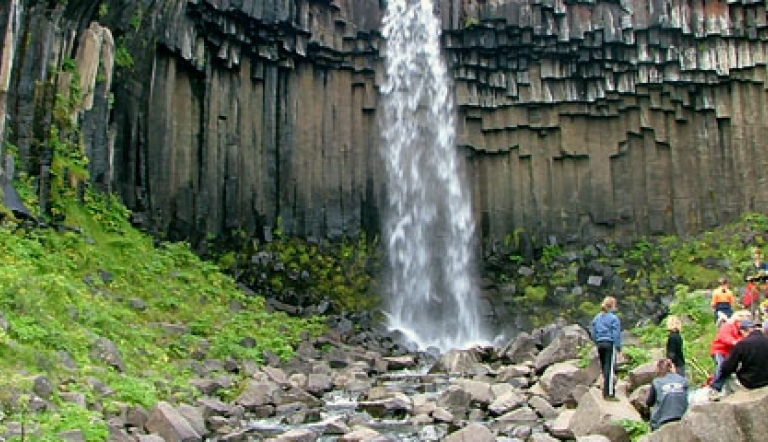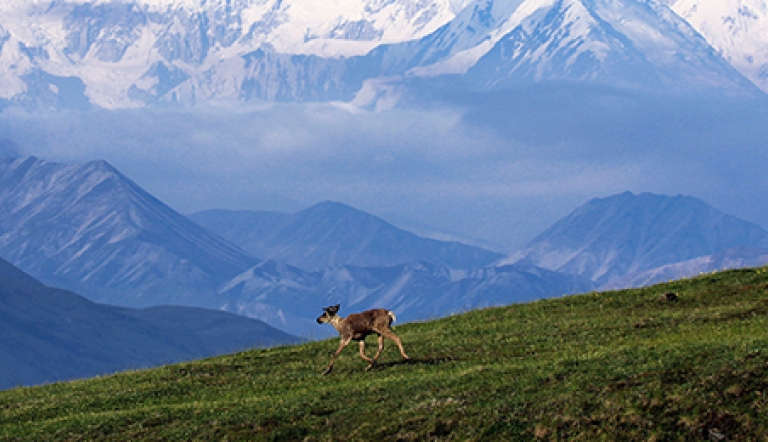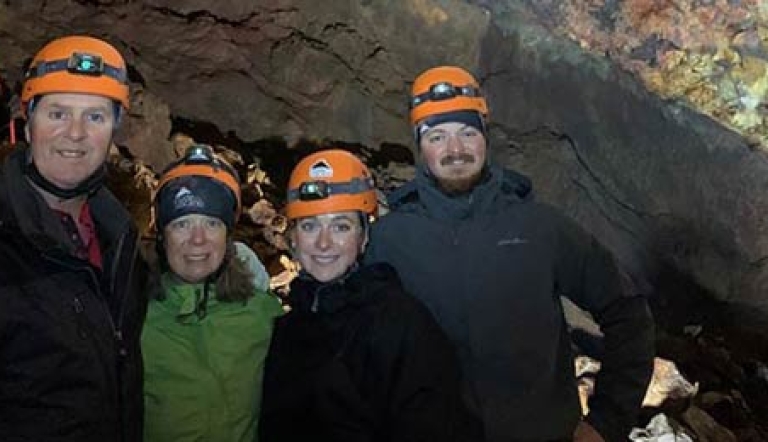Iceland Solar Eclipse Experience with SimonBiologyTravel
About this trip
 Iceland’s history, culture, geographic isolation, and harsh natural conditions have given rise to a rich and unique cultural identity despite encompassing one of the most sparsely populated areas in Europe. This particular trait, which has resulted in reduced light pollution, along with its proximity to the point of maximum eclipse, makes Iceland the ideal place to observe the upcoming 2026 total solar eclipse. Join Eric Simon for this unforgettable experience and journey through western Iceland — from the capital of Reykjavík to the famed Golden Circle and the Snæfelsness Peninsula — to explore themes of history, folklore, architecture, government, and agriculture. Examine how Icelanders balance tradition with modern society and the sustainable management of limited resources. Along the way, experience the breathtaking geological formations for which the country is known, including volcanoes, caves, geysers, and waterfalls.
Iceland’s history, culture, geographic isolation, and harsh natural conditions have given rise to a rich and unique cultural identity despite encompassing one of the most sparsely populated areas in Europe. This particular trait, which has resulted in reduced light pollution, along with its proximity to the point of maximum eclipse, makes Iceland the ideal place to observe the upcoming 2026 total solar eclipse. Join Eric Simon for this unforgettable experience and journey through western Iceland — from the capital of Reykjavík to the famed Golden Circle and the Snæfelsness Peninsula — to explore themes of history, folklore, architecture, government, and agriculture. Examine how Icelanders balance tradition with modern society and the sustainable management of limited resources. Along the way, experience the breathtaking geological formations for which the country is known, including volcanoes, caves, geysers, and waterfalls.
Highlights
- Delve into Icelandic culture and history during a tour of the capital, Reykjavík, and at Þingvellir National Park, the original site of the most ancient parliament in the world.
- Experience a once-in-a-lifetime viewing of the 2026 total solar eclipse from an ideal location within its path of totality.
- Go on a whale watching boat excursion across Faxaflói Bay for the chance to spot humpback, orca, blue, and minke whales, and other Arctic and Subarctic marine life.
- Travel along the world-renowned Golden Circle, including stops at the Geysir geothermal area and Gullfoss waterfall.
- Discover the unique geological features and impressive bird life of Snæfellsnes Peninsula, including the naturally and culturally significant Snaefellsjökull National Park.
- Enjoy an innovative "stem-to-table" dining experience at Friðheimar Greenhouse.
Meet your leader
 Eric J. Simon
Eric J. Simon
Eric J. Simon, Ph.D., is a Professor in the Department of Biology and Health Science at New England College, in Henniker, New Hampshire. Dr. Simon has led over a dozen international trips to learn about biology and culture to such destinations as Belize, Patagonia, Galapagos, Tanzania, the Amazon, and Cuba. As a biology author, Dr. Simon has over 2 million books in print, translated into 7 languages, and used in over 40 countries.
$9,995
Per person
About this price
Land cost only. Does not include round-trip airfare to and from destination.
Single room supplement $1025
What makes us different
Rich content
Carbon offsetting
Service anytime
Culture in context
Value for your money
Support local communities
Daily Itinerary
Print ItineraryReykjavik
Reykjavik
Reykjavik
Reykjavik
Reykjavik
Pricing
Print Pricing$9,995
Per person
About this price
Land cost only. Does not include round-trip airfare to and from destination.
Single room supplement $1025
What's Included
- Activities and meals as mentioned in itinerary
- Full time guide for the duration of your program
- Shared services during tours and transfers (non-private)
- Arrival and departure transfers based on individual flight schedules
- All tips
- Non alcoholic beverage with meals
- Carbon Offset
What's Not Included
- International airfare
- Travel Insurance
- Items of personal nature
Pricing Details
A $350 per person deposit is due to hold your space on this trip. 99 or more days before departure: $100 cancellation fee; remaining balance is refunded. 98 - 0 days before departure: 100% of program price is forfeited.
Holbrook Travel strongly recommends the purchase of travel protection for medical emergencies while traveling and to protect your investment. Please note the purchase of Cancel for Any Reason Coverage or to exclude pre-existing conditions with Trip Cancellation coverage may require policy purchase within 10-14 days of your initial deposit, depending upon the provider.
Single room supplement $1025
Final payment due date: May 03, 2026
Travel Info
Print Travel InfoEntry & Exit Requirements
U.S. citizens must have a passport valid at least three months beyond your planned date of departure from Iceland. As this requirement is subject to change without notice, we recommend at least six months' validity. Passport should have at least two blank pages.
A visa is not required for visits up to 90 days.
If you are not traveling with a U.S. passport, please check with the Icelandic Embassy for the requirements based on your nationality.
Health Information
IMMUNIZATIONS
The Centers for Disease Control recommends that all travelers be up to date on routine vaccinations such as measles-mumps-rubella (MMR) vaccine, diphtheria-pertussis-tetanus vaccine, varicella (chicken pox) vaccine, and your yearly flu shot before every trip.
There are no vaccinations required for entry into Iceland.
The CDC recommends vaccination against hepatitis A and hepatitis B for most unvaccinated travelers visiting Iceland.
Please consult your physician for additional information and recommendations based on your individual circumstances.
FROSTBITE
Frostbite is damage to the skin from freezing and is due to prolonged exposure to cold temperatures. Symptoms include patches of reddened skin that become white, hard, and swollen; or skin that burns, tingles, or is numb or painful. Severe cases can result in blisters or ulcers forming and may involve deeper tissues. The most common sites for frostbite are the fingers, hands, toes, feet, ears, nose, and cheeks.
To avoid frostbite, dress warmly and in layers but avoid tight clothing as it may reduce circulation. Keep the face and extremities covered. Avoid overheating and excessive perspiration. Change wet clothing, especially socks and gloves.
HYPOTHERMIA
Hypothermia is life-threatening. It is caused by cold, wet, or windy weather that causes the body to lose heat faster than it can produce heat. Hypothermia can occur in rugged mountain terrain where the weather can change extremely fast, or after being soaked in cold rivers or lakes.
Symptoms include feeling cold, uncontrollable shivering, clumsiness due to loss of muscle coordination, slurred speech, inability to think clearly, and eventual unconsciousness and cessation of reflexes including heart and lung functions. Many victims in the later stages of hypothermia feel warm and try to shed clothing.
To treat hypothermia, first warm the core of the body before the extremities. Remove any wet clothing. Re-warm the victim slowly; do not warm fast by immersing in warm/hot water. Provide shelter out of the weather. Warm drinks are not necessary, but may help in the psychological recovery. Do NOT give alcohol. Try to keep victim awake as this helps keep the body temperature up.
SUN EXPOSURE
Despite cold temperatures, the effects of the sun can be damaging to the eyes and skin. Spending time outdoors exposes you to the sun’s harmful ultraviolet (UV) rays, even on cloudy days. To protect yourself from the sun, use a broad spectrum sunscreen of at least SPF 15, protect skin with clothing, wear a wide-brimmed hat and sunglasses, and drink plenty of fluids.
Respiratory Illness Protocols
Please review our Respiratory Illness Protocols page, which explains our policy and procedures if you or another traveler should develop symptoms of a respiratory illness during your trip. Your participation in a Holbrook Travel program indicates that you are in agreement with these protocols.
Resources
Print ResourcesPacking Recommendations
Everyone has personal preferences when it comes to packing; for this reason, the information below is offered as a general guide and not a definitive list. You know yourself best: Use your discretion and pack what you think will serve you, based on your personal preferences and specific itinerary.
You may find many of the items below in our Gear Store.
CLOTHING
Bring enough clothing suitable for the length of your program. During summer, the weather in Iceland will feel more like early spring or late fall. There may be warm days, but also expect cold, rain, mist, and fog. Pack clothing that can be worn in layers to adapt to weather changes throughout the day.
- A combination of short-sleeved and long-sleeved shirts
- Long pants, jeans, or trousers
- Undergarments
- Sleepwear
- Jacket or sweaters/sweatshirts
- 1-2 bathing suit(s) for swimming in hot springs
- Socks – Bring extra pairs.
- Shoes – Consider your specific itinerary when choosing footwear. For most programs, you’ll likely want at least one pair of comfortable, closed-toe walking or hiking shoes with good ankle protection. In addition, many participants opt for a pair of sturdy sport-strap sandals (e.g. Keens, Tevas, or similar) and/or casual flip-flops or sandals (for around the hot springs or your accommodations).
- Lightweight rain jacket, hooded poncho, and/or windbreaker
- Wool hat or beanie
- Gloves
- Bandana, scarf, or Buff-style headwear
Personal Toiletries
Pack toiletries based on your personal preferences and habits. Below are just a few recommendations to keep in mind.
- Shampoo, conditioner, lotion, deodorant/antiperspirant , etc.
- Soap and washcloth or a small, quick-drying microfiber towel
- Hairbrush, comb, hair ties, shower cap. Most—but not all—hotel rooms provide a hair dryer, but you may wish to bring one from home.
- Toothbrush and toothpaste
- Razor
- Ear plugs, especially if you are a light sleeper
- Personal hygiene products
- Insect repellent with DEET or picaridin
- Sunscreen and lip balm with SPF
- Aloe vera gel
In addition to your personal toiletries, it is useful to pack a small medical kit, which you can easily prepare. Helpful items might include: bandages, antihistamine, a pain reliever, motion sickness and/or altitude sickness medication (if you are prone to either), anti-diarrhea medicine, individually wrapped pre-moistened towelettes and/or hand sanitizer, antibiotic ointment, anti-fungal cream, a travel pack of tissues, moleskin for blisters, eye drops, tweezers, a mini sewing kit, and an extra pair of disposable contact lenses or eyeglasses if you wear them.
Miscellaneous
Remember to pack valuables such as your passport, cash/credit cards, and medications in your carry-on luggage.
- Passport and photocopies of all travel documentation
- Personal insurance card and travel insurance information
- Money – ATM/credit card, traveler's checks, and/or cash; small bills in good condition are recommended
- Prescription medicines (if applicable), with a copy of the prescription
- Sunglasses with strap
- Small day pack for hikes and excursions
- Flashlight and/or head lamp
- Travel alarm clock or inexpensive waterproof wristwatch with alarm
- A pocket calculator or phone to assist with conversions and currency exchange
- Binoculars with lens cleaner
- Camera and related equipment, such as charger, lenses, and extra memory cards
- Reusable water bottle
- Non-perishable snacks
- Pocket-knife or multipurpose tool - Pack in your checked luggage
- Zip-top style bags – useful for packing toiletries, sorting clothing, storing damp or muddy shoes, or as a dry bag for protecting electronics)
- Notepad or travel journal and pen
- Music or reading material for down time, long bus drives, or on the airplane, and a portable bright light to read by
- Collapsible walking stick with rubber tip
- Money belt
- Chargers for electronics
- Plug converter and voltage adapter

Questions
Contact Lisa Palmese-Graubard at 800-451-7111 x339 or lisa@holbrooktravel.com.

